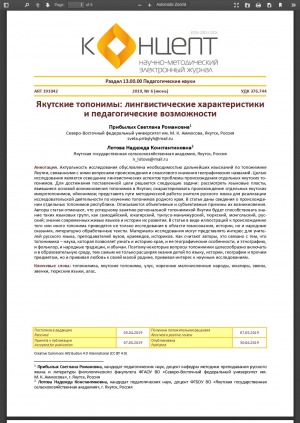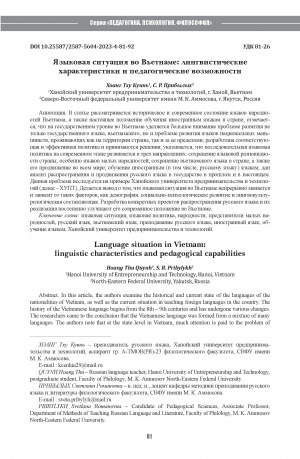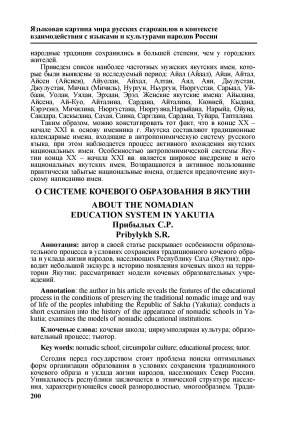Место работы автора, адрес/электронная почта: Северо-Восточный федеральный университет им. М. К. Аммосова, Филологический факультет ; 677013, г. Якутск, ул. Кулаковского, 42 ; e-mail: sv.pribylykh@s-vfu.ru ; https://www.s-vfu.ru/
Ученая степень, ученое звание: канд. пед. наук
Область научных интересов: Методика преподавания русского языка, педагогика высшей школы
ID Автора: SPIN-код: 6407-7150, РИНЦ AuthorID: 414655, ORCID: 0000-0003-1226-6853
Год выпуска: 2019
The relevance of the study is due to the need for further research on the toponymy of Yakutia, related issues of the origin and semantic meaning of geographical names. The purpose of the study is to highlight the linguistic aspects of the problem of individual Yakut toponyms origin. To achieve this goal, the following tasks are solved: to study the language strata, which were the basis for the emergence of toponyms in Yakutia; to characterize the origin of individual Yakut microtoponyms, oeconyms; to present the ways of the methodical work of the Russian language teacher for the implementation of research work on the study of the native land toponyms. The article provides information about the origin of individual toponyms in the republic. The objective and subjective reasons for their origin are described. The authors of the article note that knowing such language groups as Samoyed, Yukaghir, Manchu-Tungus, Turkic, Mongolian, Russian will contribute to the successful learning of regional toponymy of Yakutia, as well as knowledge of modern living languages and the history of their development. The article, in the form of illustrations to the origin of a toponym, cites not only the works in the field of linguistics and history, but also folk tales and literary texts. Research materials may be interesting to teachers of Russian, university academic staff, regional ethnographers, and historians. This is due to the fact that, according to the authors, toponymy is a science that allows us to learn the history of the region, its geographical features, ethnography, folklore, folk traditions and customs. Therefore, it is advisable to include some toponymic questions in the educational environment, thereby expanding not only children's knowledge of language, history, geography, etc., but also infusing children with love for their homeland, cultivating an interest in scientific research
Количество страниц: 12 с.
Хоанг Тху Куинь. Языковая ситуация во Вьетнаме: лингвистические характеристики и педагогические возможности / Хоанг Тху Куинь, С. Р. Прибылых ; Северо-Восточный федеральный университет им. М. К. Аммосова, Ханойский университет предпринимательства и технологий // Вестник Северо-Восточного федерального университета им. М. К. Аммосова. Серия "Педагогика. Психология. Философия". - 2023. - 4 (32). - C. 81-92. - DOI: 10.25587/2587-5604-2023-4-81-92
DOI: 10.25587/2587-5604-2023-4-81-92
Количество страниц: 4 с.
- Общественные науки. Образование > Народное образование. Воспитание. Обучение. Организация досуга > Организация воспитания и образования. Школоведение,
- НАУКА ЯКУТИИ > ОБЩЕСТВЕННЫЕ НАУКИ > Народное образование. Воспитание. Обучение. Организация досуга > Организация воспитания и образования. Школоведение.
Прибылых, С. Р. О системе кочевого образования в Якутии / С. Р. Прибылых // Языковая картина мира русских старожилов в контексте взаимодействия с языками и культурами народов России : сборник материалов Всероссийской с международным участием научно-практической онлайн-конференции, (Якутск, 19-21 ноября 2020 г.). - 2021. - С. 200-203


